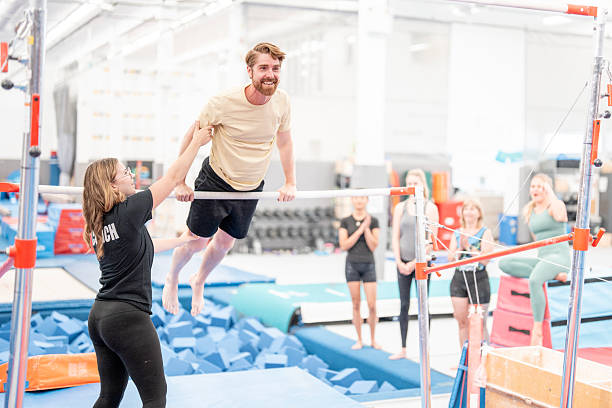Life as a student is a constant juggling act. You’re trying to balance classes, homework, friends, a part-time job, and maybe a little sleep, all while trying to figure out your future. It’s easy to feel overwhelmed, and for many, staying fit and active seems like just another chore to add to the list. But what if there was one activity that could help you ace your exams, reduce your stress, and give you the energy to take on everything else? That activity is playing sports.
Sports are much more than just a game. They’re a powerful classroom for life, a place where you can learn about yourself, your limits, and how to push past them. When you step onto a field, a court, or into a pool, you’re not just training your body; you’re training your mind. Playing sports can help you build amazing physical strength. It also fosters mental discipline that benefits you for life.
The Unseen Classroom: How Sports Build Discipline
Contents
While the physical benefits of sports are obvious, the mental lessons are arguably more important. Sports require a level of commitment and mental toughness that can be directly applied to every part of a student’s life. Think of it as a form of active learning for your brain.
Time Management and Prioritization 🗓️
One of the biggest struggles for students is feeling like there aren’t enough hours in the day. Student-athletes juggle practices, games, team meetings, and travel with schoolwork. They must master time management. There’s no time for procrastination.
You learn to use every spare moment wisely. The bus ride to a game becomes a chance to review notes. The hour before practice is for finishing an assignment. This structured life teaches you the discipline of planning and following a routine. A student-athlete’s day might go like this: wake up for a morning workout, attend class, grab a quick lunch, join a study session, practice for two hours, and then return to the dorm to tackle homework. This balancing act teaches you to prioritize what’s important—getting that paper done before you can relax with friends or go to practice. This skill of managing a packed schedule is invaluable. It teaches you to be efficient, organized, and reliable.
Goal-Setting and Perseverance 🎯
Every sport is built on goals. Whether it’s scoring a point, winning a game, or mastering a new skill, you are always working toward something. The journey is rarely easy. You will face setbacks, losses, and moments where you feel like giving up. This is where perseverance comes in.
When you miss a free throw, drop a pass, or lose a race, you’re faced with a choice: do you give up, or do you work harder to get better? Sports teach you to embrace failure as a learning opportunity. You learn to analyze what went wrong, correct your mistakes, and get back to work. This ability to accept defeat, learn from it, and come back stronger is the very definition of perseverance. This resilience is a key ingredient for success in both the classroom and your future career. The next time you get a bad grade on a test, that sports-honed mental toughness will kick in, helping you to study smarter and keep moving forward. The process of setting and achieving short-term goals (like perfecting a new skill) and long-term goals (like winning a championship) is a powerful lesson in planning for life.
Mental Toughness and Emotional Control 🧠
Sports are full of high-pressure situations. The final seconds of a close game, a last-minute penalty shot, or a tie-breaking point—these moments can be incredibly stressful. Athletes learn to manage their emotions, block out distractions, and stay focused on the task at hand. This is mental toughness.
This skill translates directly to the challenges of student life. When you’re sitting in a big exam, about to give a presentation, or waiting for a job interview, you need to be able to stay calm and focused. The emotional control you build on the field helps you handle these high-stakes situations with confidence. Instead of panicking, you can take a deep breath, trust your training, and perform to the best of your ability.
Accountability and Commitment 🤝
When you join a sports team, you’re not just committing to yourself; you’re committing to your teammates. They are relying on you to show up on time, to put in the effort, and to do your part for the team to succeed. This creates a powerful sense of accountability.
This responsibility shows you how important it is to keep your promises. It also highlights the value of being a dependable teammate. It instills a strong work ethic that goes far beyond the sport itself. You become a more dependable student, a more trustworthy friend, and eventually, a more committed employee. The discipline of showing up, even when you don’t feel like it, is a lesson that will serve you for a lifetime.
More Than a Workout: How Sports Build Strength
While the mental benefits are profound, we can’t forget the amazing impact sports have on your physical health. Getting your body moving regularly is one of the best things you can do to feel more energized, sleep better, and improve your overall well-being.
Muscular and Bone Development 💪
All sports, from soccer to swimming, require the use of muscle groups to perform specific movements. This consistent physical activity puts a healthy amount of stress on your muscles and bones. Over time, your body adapts to this stress.
- Muscles: Regular use causes tiny tears in your muscle fibers. When these fibers repair, they grow back stronger and bigger. This process, called hypertrophy, leads to increased muscle mass and strength. This also builds core strength. Core strength is key for movement and helps prevent common injuries, such as back pain.
- **Bones:** Weight-bearing activities, such as running, jumping, and playing tennis, stress your bones in a healthy way. In response, your body deposits more minerals into your bones, making them denser and stronger. Building bone density now is especially important, as it helps prevent osteoporosis later in life.
Enhanced Cardiovascular Health ❤️
Most sports are excellent for your heart. Cardiovascular activities, like running and basketball, raise your heart rate and keep it elevated for a long time. Over time, your heart becomes more efficient. It learns to pump more blood with each beat, which leads to a lower resting heart rate and healthier blood pressure. A strong, efficient heart means more energy for your day-to-day life. You’ll feel less tired and have more stamina for those long days of classes and studying. Many sports feature short bursts of high-intensity, anaerobic training. This includes sprinting to the finish line or quickly speeding up on the court. This mix of aerobic and anaerobic exercise builds a strong and efficient cardiovascular system.
Better Coordination and Balance 🤸
Playing sports forces you to be aware of your body in space. Whether you’re dodging an opponent, catching a ball, or balancing on one leg, you’re constantly improving your motor skills. This includes coordination, agility, and balance. These are not just skills for the field; they are useful in everyday life. Better coordination helps you feel confident and less clumsy. Improved balance also prevents falls and injuries.
Injury Prevention and Recovery 🩹
When you play sports, you’re strengthening not just your muscles and bones, but also the ligaments and tendons that support your joints. This added support helps reduce the risk of common injuries. Additionally, a consistent training routine helps your body get better at recovering. You learn to listen to your body. Rest, good nutrition, and stretching are important. They help keep you healthy and ready for your next challenge.
The Role of Coaches and Teammates: A Built-in Support System
You don’t have to go it alone. One of the strongest parts of sports is the team environment. It offers a vital support system that goes beyond just the game.
The Coach as a Mentor
A coach is more than just a person who calls plays. They are often a mentor who teaches you about discipline, strategy, and resilience. A good coach can help you see your potential, challenge you to improve, and teach you how to handle criticism gracefully. Their guidance can be invaluable for your personal and academic growth. The respect you learn to show a coach is a lesson that will serve you well when working with professors or future bosses.
The Power of Teammates
Your teammates are your built-in support network. They are the people who understand the long hours of practice, the frustration of a loss, and the joy of a win. This shared experience creates a bond that is hard to find anywhere else. Your teammates will motivate you on the field, and that support often carries over into your social life and even your studies. They can be the ones to help you with a tough homework problem or encourage you when you’re feeling stressed. This collaborative environment teaches you the importance of empathy, communication, and working together.
Beyond the Field: Applying Sports Lessons to Life
The skills you learn playing sports don’t stay on the field. They become a part of who you are, shaping how you approach the world.
In the Classroom 📚
The discipline and focus you build from training directly improve your study habits. You learn to concentrate for longer periods, block out distractions, and set clear academic goals. The perseverance you learn from losing a game helps you keep going when you get a tough assignment or a bad grade. You also have more energy and less stress, which makes it easier to learn and retain information.
In Social Life 😊
Team sports are a fantastic way to meet new people and build a strong community. You learn to communicate effectively, build trust, and work together with a diverse group of people. These social skills are essential for forming lasting friendships and finding your place on campus. A team provides a built-in support system, which is incredibly important for a student’s mental health.
For Your Future Career 💼
Employers are always looking for people who can work well on a team, show up on time, and handle pressure. These are all skills you develop as a student-athlete. The time management you learned to balance school and practice will make you a highly organized and efficient employee. The mental toughness you built on the field will help you stay calm. This skill is useful during job interviews and when you face tight deadlines at work. The accountability you learned will make you a trustworthy and dependable colleague.
Your First Step: Overcoming the Biggest Obstacle
We all know exercise is good for us. The real challenge is finding the motivation to start. It’s easy to say, “I’m too busy,” “I’m too tired,” or “I’ll do it tomorrow.” The biggest obstacle isn’t a lack of time; it’s the feeling that you have to be perfect.
Instead of thinking about a full hour at the gym, just put on your sneakers and walk out the door for 15 minutes. The goal isn’t to set a world record or have the perfect workout. The goal is to simply start. Taking one small, positive action creates a domino effect. That 15-minute walk can lead to a 30-minute jog a few days later, which can eventually lead to a regular sport you love. The key is to remember that consistency is more important than intensity. Even a little bit of activity is far better than none. Don’t wait for the perfect moment. The best time to start is right now.
Frequently Asked Questions
Q1: Is it okay if I’m not good at sports?
Absolutely! Most student sports clubs and intramural leagues are open to all skill levels. The focus is on having fun, staying active, and building a community, not on being a star athlete.
Q2: Will playing sports hurt my grades?
On the contrary, studies show that physical activity can actually improve academic performance. Exercise helps you focus, reduces stress, and can even boost your memory, all of which can lead to better grades.
Q3: How do I start if I don’t have much money or equipment?
Many sports are free! You can go for a run, join a campus basketball game, or hike a local trail. Your university recreation center likely has free equipment you can rent for sports like tennis or badminton.
Q4: What’s the best sport for building discipline?
Any sport that requires regular practice and teamwork can build discipline. Individual sports, like swimming and running, boost mental discipline and self-motivation. Team sports, such as basketball and soccer, teach time management and accountability.
Q5: What if I’m a beginner and feel intimidated?
Feeling intimidated is completely normal. The best way to overcome it is to start with a beginner-friendly sport or a casual, no-pressure team. Look for campus intramural leagues or club sports that are specifically designed for all skill levels. Remember that most people are just happy to have another person to play with.
Q6: How can I find a sport that’s right for me?
Think about what you enjoy. If you like teamwork and competition, a team sport might be a good fit. If you prefer solo activities and a chance to clear your head, something like running or swimming could be perfect. The key is to try a few different things to see what you enjoy most.





